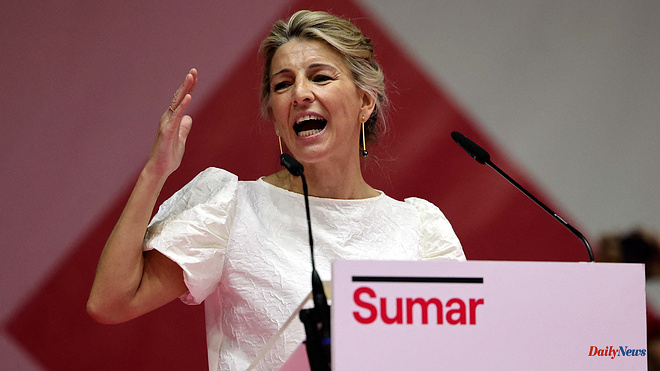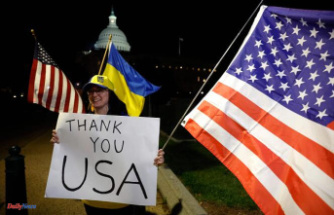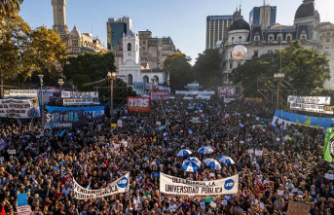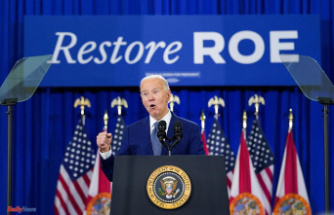On the day after the announcement of her candidacy for the general elections, Yolanda Díaz has placed in Podemos the responsibility of having "stayed out" of the photo of Magariños, where fifteen parties did come to cover the second vice president of the Government. "Many political formations that today compete with each other knew how to rise to the occasion. Whoever is not there must explain it to the country," she said on TVE. She went so far as to affirm that the conflict with Podemos is not due to the configuration of the lists, to the primaries, but to other "interests" of her own: "I am not going to reveal them."
The candidate does not withdraw. If Sumar's act already looked bad for Podemos, the conclusion is that it was even much worse. Yolanda Díaz now flies without "guardians" or "debts" - (in) direct darts at Iglesias. She did not make any explicit reference to the purple party in her speech, nor any gesture of recognition or that could be read as an outstretched hand. On the contrary, she proclaimed her independence to lead the space to the left of the left, even she challenged the PSOE.
The novelty on Sunday was not his burial of Podemos, a confirmation, but that "I want to be the first president of Spain" that points to Pedro Sánchez, his guarantor in the motion of censure. Díaz had the support of a former PSOE deputy, trans activist, Carla Antonelli, who left those acronyms not long ago; She saw among her guests a former CCOO general secretary who was a PSOE deputy, Antonio Gutiérrez, and was received by a celebrity, Jorge Javier Vázquez, who campaigned with Ángel Gabilondo in the 2021 Madrid elections.
About Díaz, socialist sources warned from this newspaper, a week ago: «His speech does not differ practically from that of the president, it is a risky bet to join the fate of the PSOE to his figure. Remember what happened with Manuela Carmena, they played to promote a person well regarded by the left, and that weakened the socialists in Madrid ». That alert was a confirmation yesterday, together with the free takeoff of Podemos.
He barely left an isolated message of concord in purple code: "There are many people left to add" and "we are going to join all of them." In contrast, he overwhelmed the leaders present with affection and offered his moment of acclaim to candidates such as Mónica García and Rita Maestre, from Más Madrid, and Joan Ribó, from Compromís, who will compete against Podemos, and also against the PSOE, of course, in the May elections.
Podemos was not only cornered. He saw how the greatest reference in that political space, at its media peak, complimented three rivals with a campaign tone. Those gestures, cheered, enraged Podemos. Juan Carlos Monedero: «She is a minister of United We Can and has campaigned for parties that compete against United We Can. That is noise. Thunderous". The party officially opted for silence. No comment.
Díaz promulgated a new style of exercising leadership and understanding politics that breaks with the tradition of Podemos since 2017 and that challenges its instruction manual from top to bottom. Faced with a strategy of permanent offensive and the search for "polarization" or "hardness" -two nouns that he cited in his speech-, he advocated getting rid of the "noise" to do "politics with capital letters" and, he stressed, with " tenderness".
It is a friendly face that Pabloism already ridiculed from Íñigo Errejón when they parted ways, long before breaking up, and which they then dismissed for being "docile" politics.
This is reflected in an evident way in the ideological banners. What is worrisome for Podemos, even for the PSOE, is not what Yolanda Díaz said yesterday, but everything that she did not say. She did not speak to the excess of the "ultra-right" -like Iglesias or Sánchez-, nor did she attack judges, journalists or "sewers". She ignored the war and NATO. She did not insult businessmen and bankers; she asked to share her profits. She also did not allude to the monarchy.
He surpassed the President of the Government in positivism. And he placed Alberto Núñez Feijóo and his economic liberalism as a rival. He presented a social democratic agenda, very PSOE, to "win" a country "for the next decade" and claimed the achievements of a "useful policy" that separates "politicking" - that was for ERC, for the labor reform - and focuses in tangible social transformations. It is not just that Díaz became independent from Podemos. It is that he contested it while he was striding towards Sánchez.
Now, Díaz has to rebuild the relationship with Podemos. But no winks at the moment. In an interview this Monday on TVE, Díaz has indicated that she would have "lovely" that the purple party had attended Sumar's event this Sunday and that she tried "until the last minute" but has indicated at the same time that this is not does not imply any brake on the project that will be presented to the autumn general elections. "All in all, the citizen movement has started and we will continue to move forward," she warned.
Díaz has celebrated that there are fifteen political formations (such as IU, the commons, Más País, Más Madrid or Compromís), who came to "accompany" the step forward that Sumar took yesterday, his political project, without any of them having put "conditions" to his presence. As did Podemos. However, and without wanting to go into details, the vice president wanted to make it clear that her disagreement with Podemos is not because of the holding of primaries, which she says she will do to configure the lists, but other issues. "I am not going to reveal the interests of this political formation," she said, referring to Podemos, "but it is not true that we have differences in the formation of primaries."
That is why he has insinuated that there are other issues behind it. "They have made a decision and they have been left out," she pointed out. "It must be Podemos that must explain why on a day that was important for Spain and that it was a happy day they were not there." "I think that [for the primaries] was not the difference," she has sentenced.
Díaz has claimed his leadership, although he will also submit to primaries, and has defended Sumar as a "completely autonomous project that is not complementary or subordinate to anyone." In addition, he has assured that the votes "belong to the people" and not to any party.
The second vice president has said that the "first person" she told about the creation of Sumar was Pablo Iglesias but has indicated that she has not spoken with him since January, when they had a "very interesting" conversation, which she did not want reveal nothing.
Regarding the electoral candidacy itself, he stressed that Sumar is a "citizen movement" and not a new political organization, as Podemos says, and has indicated that therefore "there will not be a sum of acronyms." The political parties that were at Magariños on Sunday or those who want to sign up "have to be there but they don't have to be." That is why he has refused to talk about what will be the legal formula with which they will be presented to the elections. "They don't stop me on the street to talk about the legal tool."
Díaz will explain his project for the country in more depth in "the next few days", when he finishes the work being carried out by the experts he has recruited, however, yesterday it was already seen that it has a transformative and genuinely social democratic imprint. That is why he wants to lead a broader space that disputes the vote for the PSOE. Hence, he has indicated that he does not present himself as a "complement" to Sánchez but to reach a "social majority". Of course, he will cooperate to reissue the progressive coalition government "but from autonomy."
In the interview, he once again revealed that his role in the campaign will be discreet because Sumar is not "prepared" to present himself in the May elections. Thus, and regardless of the acts that she can do to help Ada Colau in Barcelona, she has said that she remains "as a result" of her team and that she will help only to the extent of her possibilities.
At the same time that Díaz was interviewed, Podemos has made its first official evaluations of the act of Sumar. The co-spokesman, Pablo Fernández, has welcomed the fact that Díaz "has finished organizing her political space" and has emphasized that it is "necessary" for an electoral agreement to be produced between Podemos and Sumar. "Our hand is still outstretched to agree on primaries open to the public," he pointed out in RNE.
For his part, Pablo Iglesias has exposed the difficult digestion that his party has had after seeing the act of Magariños. "Today is one of those days in which it is necessary that the stomach does not disturb the head," said the former general secretary of Podemos.
"We must claim that unity is more necessary than ever, that it is very important that Podemos and Sumar reach an agreement for the elections. This goes beyond personal feelings and little pullitas", he finished off in a speech at RAC1 .
"If in the end they get Sumar to decide to go without Podemos, that is going to be an electoral and political tragedy," warned Iglesias, who has challenged those who think that Podemos would "subtract" them in an electoral contest to say so "openly." For him, "this is a mistake" because "Podemos continues to be the great ideological actor of the left in Spain," reports Efe. In his opinion, Díaz "thinks that she can effectively be president of Spain occupying the symbolic space of the PSOE", an analysis that Iglesias does not share.
According to the criteria of The Trust Project












